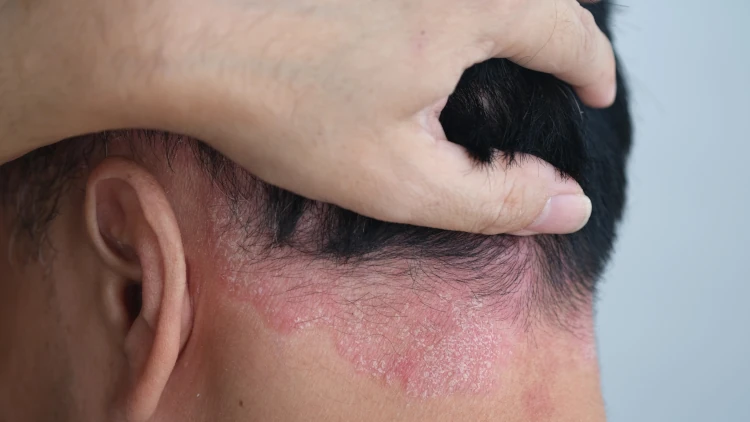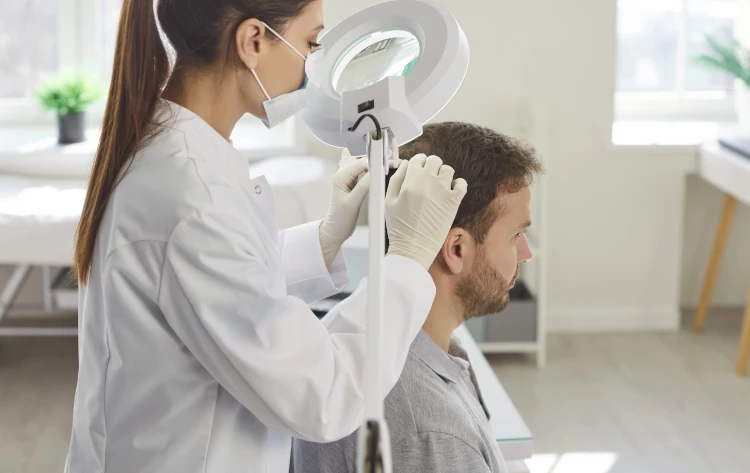
Scalp Psoriasis and Hair Loss: What Is the Connection?
Scalp psoriasis doesn’t directly cause permanent hair loss. However, inflammation, persistent scratching, and stress can lead to temporary hair shedding — a condition known as telogen effluvium, which may give the appearance of thinning.
Grasping this connection gives people a better shot at managing symptoms and protecting their hair. Once you recognize what’s fueling the issue, it becomes easier to take the right steps.
How Scalp Psoriasis Affects the Hair and Scalp
Scalp psoriasis leads to thick, scaly patches across the scalp. These plaques irritate the skin and disrupt hair follicles, which can lead to breakage and shedding.
To understand how scalp psoriasis contributes to hair loss, it helps to break down what’s happening on a biological level:
- Inflammation can weaken follicles: When the scalp is chronically inflamed, the surrounding tissue becomes less stable, making it harder for hair to stay rooted.
- Persistent scratching causes physical damage: Frequent itching, while often unavoidable, can pull out strands and create micro-tears that irritate the skin further.
Immune flare-ups disrupt the growth cycle: During active periods, the immune system’s heightened response can push hair follicles into a resting phase, causing temporary shedding.
Stress adds another layer of difficulty. It can worsen psoriasis symptoms while also triggering separate episodes of hair shedding. The overlap can leave people feeling like they’re being hit from both sides.
Signs You May Be Experiencing Hair Loss From Scalp Psoriasis
Hair loss tied to scalp psoriasis doesn’t always follow predictable patterns. It often appears in step with flare-ups or surfaces in spots that are especially irritated. Here are some common signs to look out for:
- Increased shedding during flare-ups: More hair in your brush or on your pillow may be noticeable when plaques are active.
- Tenderness or sensitivity at the roots: The scalp might feel sore, especially in areas with heavy scaling or inflammation.
- Thinning at affected patches: Hair may appear less dense in places where plaques are most persistent or frequently scratched.
If the shedding doesn’t stop once the flare-up fades — or if it keeps getting worse — it’s worth seeing a specialist. They can assess whether something else might be going on and suggest a personalized approach to treatment.
Treating Scalp Psoriasis To Minimize Hair Loss

To minimize hair loss from scalp psoriasis, simple, careful routines go a long way. Scalp psoriasis responds better when you avoid harsh treatments. Using medicated shampoos, gentle drying methods, and cooler water when showering can all help soothe the skin and protect fragile strands.
When flare-ups happen, reach for treatments that calm rather than strip. Topical corticosteroids and vitamin D analogs, such as calcipotriol, are the most effective treatments for scalp psoriasis. Coal tar shampoos may offer relief for mild symptoms, though their use has declined due to safety and efficacy considerations. You should always use these remedies under professional guidance. Rubbing or over-washing can backfire and make things worse.
Acting early can limit the fallout. Quick, informed treatment choices help minimize long-term damage and give your hair a better shot at recovery. Medical professionals and hair transplant specialists can also offer options based on your specific needs.
In some cases, especially when flare-ups are frequent or severe, pairing medical care with hair restoration can make a meaningful difference. These treatments won’t erase the condition, but they can restore your confidence and comfort.
Hair Restoration After Scalp Psoriasis
Hair restoration through transplants is possible; however, these procedures should only be considered once your scalp has been free of active psoriasis for a sustained period. Transplants into inflamed or unstable skin carry a higher risk of poor graft survival. Once the scalp is recovered, it may be worth looking into hair restoration methods to fill in areas that never regrew after a flare-up.
Modern transplant methods are designed to look natural. Browsing examples of past results can help you picture what’s possible for your situation. The costs involved are another important factor — understanding the financial commitment upfront can help you weigh whether it’s the right option for your needs and budget.
An artificial hair transplant is another option, especially if you come to the conclusion that traditional restoration isn’t going to work for you. They come with upsides and downsides, so understanding both will help you decide if it’s the right choice.
Some of the main benefits of artificial hair transplants include:
- Immediate cosmetic improvement: Implanted synthetic fibers create the look of fuller hair almost instantly. This can help restore confidence and improve appearance quickly.
- No donor hair required: Patients with limited donor areas can still receive coverage, so the procedure is more accessible to those who don’t qualify for traditional hair transplants.
- Minimally invasive: The procedure can be performed relatively quickly — and with less downtime — than some surgical alternatives. Recovery is typically easier, making it appealing to people with busy lifestyles.
Though they are used in some countries, synthetic hair implants are not approved by the FDA due to safety concerns. These procedures come with some risks and drawbacks, including:
- Risk of rejection or infection: The body may react negatively to foreign fibers, leading to discomfort or complications like infection or transplant rejection. This can require additional treatment and may limit future restoration options.
- Chronic inflammation: In some cases, hair transplant procedures can trigger long-term inflammation around the transplanted follicles, leading to discomfort, scarring, or poor hair growth.
- Not suitable for everyone: People with sensitive skin or active scalp conditions may not be ideal candidates for these procedures. Preexisting inflammation or immune sensitivities can interfere with their success.
Candidates should be sure to consult a specialist about potential complications before pursuing treatment.
Managing Scalp Psoriasis and Protecting Your Hair Health
Scalp psoriasis and hair loss are closely connected, but there’s room for recovery. Starting treatment early and using gentle care can support both scalp health and hair regrowth.
If you’ve been struggling with flare-ups and thinning hair, you’re not alone — and you don’t have to figure it out by yourself. With expert help and the right plan, it’s possible to feel good about your hair again.


